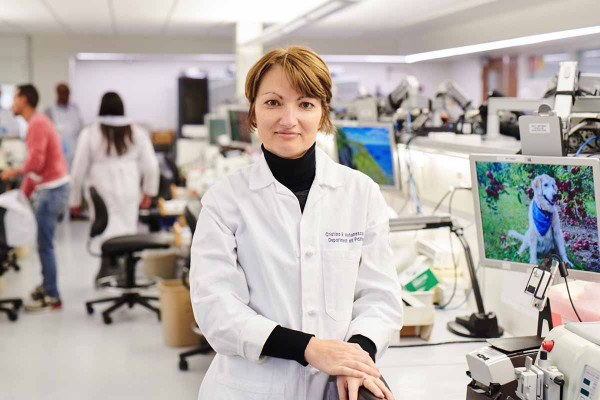FROM THE KACF SARCOMA LAB AT MEMORIAL SLOAN KETTERING

Support from the Kristen Ann Carr Fund (KACF) will fully fund Memorial Sloan Kettering Cancer Center (MSK) senior research technician Lei Zhang, PhD, as she works to uncover the genes that drive the development of rare sarcomas in children and young adults. Using state-of-the-art genetic sequencing and the genome-editing tool CRISPR-Cas9, Dr. Zhang and her collaborators will work to pinpoint the genetic alterations that cause these rare and aggressive forms of sarcoma.
Because there are so many types of sarcomas, each presents unique challenges and requires specialized therapy and expertise. The research led by Cristina Antonescu, MD—an attending pathologist and the Director of Bone and Soft Tissue Pathology at MSK, who works closely with Dr. Zhang—will help discover the molecular mechanisms driving various sarcomas. This research is critical because many of the young people who develop sarcoma currently have few or no treatment options available to them.
The experts at MSK alone care for about 200 children, adolescents, and young adults with sarcomas every year—routinely treating types of the disease that are rarely seen by healthcare professionals at other hospitals. By studying genetic data from tumors and other tissue, researchers will be able to identify chromosomal translocations, which are known causes of sarcomas in children and young adults. They will focus on genetically sequencing RNA, the messenger that carries instructions from the DNA to the building blocks of the body, and use innovative bioinformatic algorithms to identify the genes that are most likely to play a role. Then, using CRISPR-Cas9, they will be able to study the genes that appear to be common among these young patients. Eventually, Dr. Antonescu and her team plan on using the results from this study to test new treatments for even the rarest of these sarcomas.
The funding provided by KACF continues to make critical research possible, giving Dr. Zhang the power to pursue the most innovative and promising strategies to tackle every type of sarcoma that affects children and young adults. These research efforts could pave the way for the development of new drug therapies and combinations to improve treatment outcomes for pediatric cancer patients worldwide.
